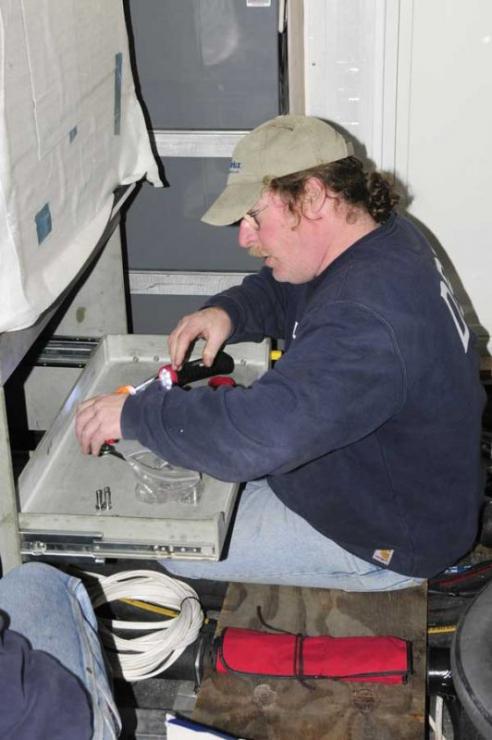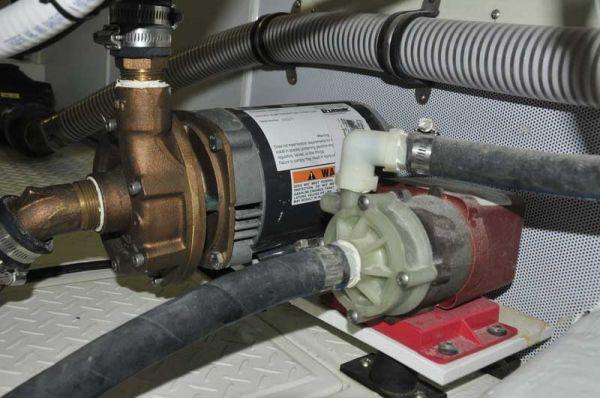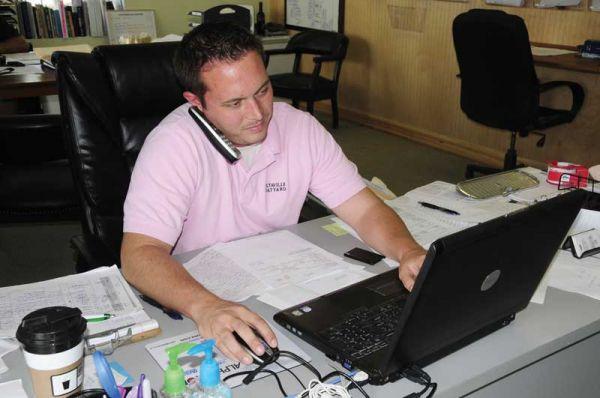That’s not our problem…
Few things irk me more than being told, “That’s not our problem” or “You need to…” when seeking assistance from an equipment manufacturer or boat builder. On one occasion I received the following reply: “We don’t make the pump, you know. We only install it; if it’s not working you need to call the manufacturer, sorry.”

The aforementioned quote came from a boat builder, for whom I was a dealer at the time. I was commissioning a new vessel that had been built only months before, and the anchor wash-down pump didn’t work. When I called the builder I was simply stonewalled, and this wasn’t unusual. For any component that failed, it seemed, no matter its age or amount of use, the protocol was to subject the customer to yet another phone call or series of phone calls or emails, tracking down the right person at the manufacturer of the pump (or battery charger, starter, water filter, etc.), in many cases with my customer anxiously wanting to be on his or her way. The customer, or dealer, is then responsible for the cost of removing, shipping, and re-installing the part.
It’s an unenviable scenario that’s played out all too often, which I’ve experienced first-hand. The above description is one of many in my “consumer support” file, and I’ve heard similar versions from many of my clients. So many in fact that I penned an editorial on the subject for a marine trade publication, taking the industry to task for this ‘pass the buck’ approach, imploring them to see the error in their ways.
What’s especially frustrating is the fact that the folks who are saying “You need to…” are often those who have selected and sold you the part and charged their mark-up. To me, profiting from the mark-up, which is perfectly acceptable, obligates them to support the product, and you, should a failure occur.
How did we get here?
I’ve often wondered how some of these policies evolved. The marine industry does seem to march to the beat of a different drummer at times, and boat owners love their boats and are willing to put up with a lot to have them. When times are good and boats are selling fast, it isn’t unusual for boat builders and boat yards to not sweat the loss of a customer here and there, and maybe more often, because there are often three to take his or her place. If you are unhappy with their “warranty” policy, your only recourse is to go elsewhere, voting with your keel as it were; however, if you aren’t missed, the “victory” in departure is a somewhat hollow one.

I suspect that these high flying times foster a lot of bad habits in the industry, many of which are perpetuated today; and perhaps when cash is more readily available boat owners are willing to put up with more and often pay more. Times like these tend to spawn policies that are consumer unfriendly, one of my least favorite being, “labor not included.” When the wash-down pump fails, provided you successfully navigate the warranty maze, the manufacturer is likely to send you a replacement; however, the labor to replace it is on you. What? Why should you ever pay the labor to troubleshoot or replace a component or assembly that failed as a result of poor workmanship or a flawed design? It makes little sense; however, it’s frequently the norm.
I encountered this scenario when several of my clients experienced failures of the same electronic product. After the second such failure (which eventually mounted to over a dozen), I approached the manufacturer. They agreed there was an issue with the product, which they assured me had now been corrected, and while they offered to supply replacements, they refused to pay for the cost associated with replacing these components (the labor was not included). At first, being accustomed to it, I was unfazed by this lack of support, yet the more I contemplated it, the more frustrated I became. Policies and behavior like this reward manufacturers for making and selling defective parts, or at the very least they get a “discount” on the cost of the corrective action.
Good things come to those who complain
The next time you encounter one of these scenarios, be vocal about your dissatisfaction. Make it known you are unhappy, and help the industry get back on course. You can begin by pushing back when a manufacturer suggests that “you need to” do something when a failure occurs in their product. In fact, make it clear that they need to do something if they wish to keep you as a customer. With the proliferation of forums where folks can share experiences, manufacturers will ignore customer’s needs at their own peril. By the same token, when a manufacturer does the right thing, give credit where credit is due and be sure to share or post that info as well.

If, in the face of a failure of a warranted component, or if it fails prematurely even after the warranty has ended, don’t easily accept the old saw, “labor isn’t included.” It’s simply not right, and just because it’s become a standard policy doesn’t mean you should accept it as a fait accompli. Sharing the cost is also an option, and a flat-rate replacement labor reimbursement would go a long way toward fostering customer loyalty. At the very least, the boat builder or yard should act as your liaison with the manufacturer of the equipment in question.
Finally, in all fairness, the boat builder mentioned at the beginning of this column wasn’t responsible for the pump failure. However, at the time they were a much better customer of the pump manufacturer than I was, and as such they carried considerably more clout with them than I did. They could easily have facilitated the warranty claim by emailing the pump manufacturer and copying me, alerting them to the failure and the need to take care of “our” mutual customer.
And, they should have shared my pain; doing so may have made them think more carefully about the warranty policies of their chosen suppliers. When I ran a boat yard I routinely acted as the go-between for my clients, and I continue to fill this role for my consulting clients today, greasing the ways for better service and periodically reminding manufacturers to do the right thing. The maxim here is: don’t be bashful about asking for help from folks who are in a better position to get results than you are.
About the Author: Former boatyard manager, technical writer, and lecturer, Steve D'Antonio, consults for boat owners and buyers, boat builders, and others in the industry.
 The aforementioned quote came from a boat builder, for whom I was a dealer at the time. I was commissioning a new vessel that had been built only months before, and the anchor wash-down pump didn’t work. When I called the builder I was simply stonewalled, and this wasn’t unusual. For any component that failed, it seemed, no matter its age or amount of use, the protocol was to subject the customer to yet another phone call or series of phone calls or emails, tracking down the right person at the manufacturer of the pump (or battery charger, starter, water filter, etc.), in many cases with my customer anxiously wanting to be on his or her way. The customer, or dealer, is then responsible for the cost of removing, shipping, and re-installing the part.
It’s an unenviable scenario that’s played out all too often, which I’ve experienced first-hand. The above description is one of many in my “consumer support” file, and I’ve heard similar versions from many of my clients. So many in fact that I penned an editorial on the subject for a marine trade publication, taking the industry to task for this ‘pass the buck’ approach, imploring them to see the error in their ways.
What’s especially frustrating is the fact that the folks who are saying “You need to…” are often those who have selected and sold you the part and charged their mark-up. To me, profiting from the mark-up, which is perfectly acceptable, obligates them to support the product, and you, should a failure occur.
The aforementioned quote came from a boat builder, for whom I was a dealer at the time. I was commissioning a new vessel that had been built only months before, and the anchor wash-down pump didn’t work. When I called the builder I was simply stonewalled, and this wasn’t unusual. For any component that failed, it seemed, no matter its age or amount of use, the protocol was to subject the customer to yet another phone call or series of phone calls or emails, tracking down the right person at the manufacturer of the pump (or battery charger, starter, water filter, etc.), in many cases with my customer anxiously wanting to be on his or her way. The customer, or dealer, is then responsible for the cost of removing, shipping, and re-installing the part.
It’s an unenviable scenario that’s played out all too often, which I’ve experienced first-hand. The above description is one of many in my “consumer support” file, and I’ve heard similar versions from many of my clients. So many in fact that I penned an editorial on the subject for a marine trade publication, taking the industry to task for this ‘pass the buck’ approach, imploring them to see the error in their ways.
What’s especially frustrating is the fact that the folks who are saying “You need to…” are often those who have selected and sold you the part and charged their mark-up. To me, profiting from the mark-up, which is perfectly acceptable, obligates them to support the product, and you, should a failure occur.
 I suspect that these high flying times foster a lot of bad habits in the industry, many of which are perpetuated today; and perhaps when cash is more readily available boat owners are willing to put up with more and often pay more. Times like these tend to spawn policies that are consumer unfriendly, one of my least favorite being, “labor not included.” When the wash-down pump fails, provided you successfully navigate the warranty maze, the manufacturer is likely to send you a replacement; however, the labor to replace it is on you. What? Why should you ever pay the labor to troubleshoot or replace a component or assembly that failed as a result of poor workmanship or a flawed design? It makes little sense; however, it’s frequently the norm.
I encountered this scenario when several of my clients experienced failures of the same electronic product. After the second such failure (which eventually mounted to over a dozen), I approached the manufacturer. They agreed there was an issue with the product, which they assured me had now been corrected, and while they offered to supply replacements, they refused to pay for the cost associated with replacing these components (the labor was not included). At first, being accustomed to it, I was unfazed by this lack of support, yet the more I contemplated it, the more frustrated I became. Policies and behavior like this reward manufacturers for making and selling defective parts, or at the very least they get a “discount” on the cost of the corrective action.
I suspect that these high flying times foster a lot of bad habits in the industry, many of which are perpetuated today; and perhaps when cash is more readily available boat owners are willing to put up with more and often pay more. Times like these tend to spawn policies that are consumer unfriendly, one of my least favorite being, “labor not included.” When the wash-down pump fails, provided you successfully navigate the warranty maze, the manufacturer is likely to send you a replacement; however, the labor to replace it is on you. What? Why should you ever pay the labor to troubleshoot or replace a component or assembly that failed as a result of poor workmanship or a flawed design? It makes little sense; however, it’s frequently the norm.
I encountered this scenario when several of my clients experienced failures of the same electronic product. After the second such failure (which eventually mounted to over a dozen), I approached the manufacturer. They agreed there was an issue with the product, which they assured me had now been corrected, and while they offered to supply replacements, they refused to pay for the cost associated with replacing these components (the labor was not included). At first, being accustomed to it, I was unfazed by this lack of support, yet the more I contemplated it, the more frustrated I became. Policies and behavior like this reward manufacturers for making and selling defective parts, or at the very least they get a “discount” on the cost of the corrective action.
 If, in the face of a failure of a warranted component, or if it fails prematurely even after the warranty has ended, don’t easily accept the old saw, “labor isn’t included.” It’s simply not right, and just because it’s become a standard policy doesn’t mean you should accept it as a fait accompli. Sharing the cost is also an option, and a flat-rate replacement labor reimbursement would go a long way toward fostering customer loyalty. At the very least, the boat builder or yard should act as your liaison with the manufacturer of the equipment in question.
Finally, in all fairness, the boat builder mentioned at the beginning of this column wasn’t responsible for the pump failure. However, at the time they were a much better customer of the pump manufacturer than I was, and as such they carried considerably more clout with them than I did. They could easily have facilitated the warranty claim by emailing the pump manufacturer and copying me, alerting them to the failure and the need to take care of “our” mutual customer.
And, they should have shared my pain; doing so may have made them think more carefully about the warranty policies of their chosen suppliers. When I ran a boat yard I routinely acted as the go-between for my clients, and I continue to fill this role for my consulting clients today, greasing the ways for better service and periodically reminding manufacturers to do the right thing. The maxim here is: don’t be bashful about asking for help from folks who are in a better position to get results than you are.
About the Author: Former boatyard manager, technical writer, and lecturer, Steve D'Antonio, consults for boat owners and buyers, boat builders, and others in the industry.
If, in the face of a failure of a warranted component, or if it fails prematurely even after the warranty has ended, don’t easily accept the old saw, “labor isn’t included.” It’s simply not right, and just because it’s become a standard policy doesn’t mean you should accept it as a fait accompli. Sharing the cost is also an option, and a flat-rate replacement labor reimbursement would go a long way toward fostering customer loyalty. At the very least, the boat builder or yard should act as your liaison with the manufacturer of the equipment in question.
Finally, in all fairness, the boat builder mentioned at the beginning of this column wasn’t responsible for the pump failure. However, at the time they were a much better customer of the pump manufacturer than I was, and as such they carried considerably more clout with them than I did. They could easily have facilitated the warranty claim by emailing the pump manufacturer and copying me, alerting them to the failure and the need to take care of “our” mutual customer.
And, they should have shared my pain; doing so may have made them think more carefully about the warranty policies of their chosen suppliers. When I ran a boat yard I routinely acted as the go-between for my clients, and I continue to fill this role for my consulting clients today, greasing the ways for better service and periodically reminding manufacturers to do the right thing. The maxim here is: don’t be bashful about asking for help from folks who are in a better position to get results than you are.
About the Author: Former boatyard manager, technical writer, and lecturer, Steve D'Antonio, consults for boat owners and buyers, boat builders, and others in the industry.